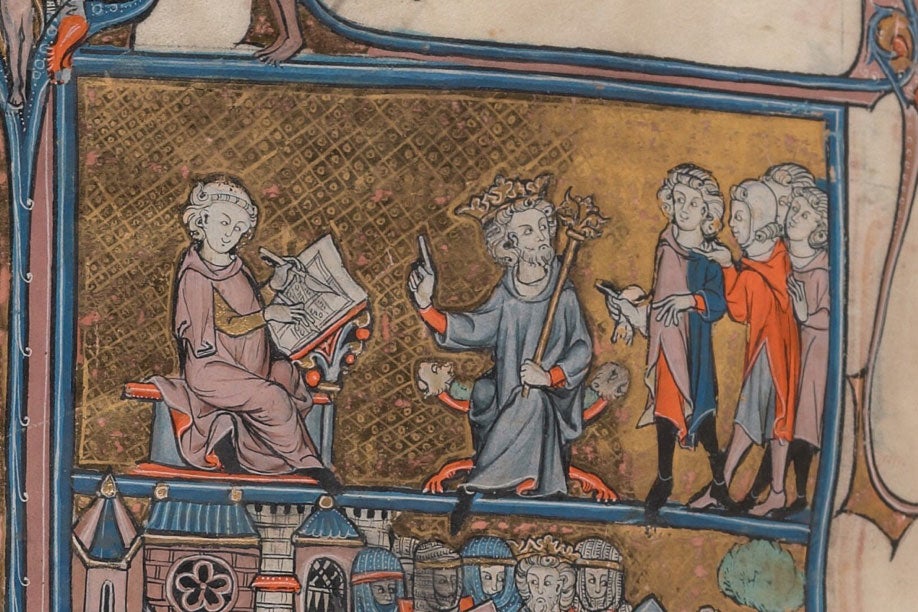The Middle Ages produced a staggering wealth of literary works, spanning dozens of languages and nearly 1,000 years. The question today is how to bring these texts to a modern audience who may not have specialized knowledge of medieval languages and contexts.

The illustration depicts King Henry II of England demanding that the Arthurian romances be written down. It appears in the beginning of La mort au Roy Artus, a 13th-century manuscript of Arthurian romances. (Image credit: Courtesy of Beinecke Rare Book & Manuscript Library, Yale University)
The Global Medieval Sourcebook (GMS) answers that question. Curated by Stanford faculty and students, the GMS is an online, interactive collection of medieval texts and their translations. It primarily features shorter texts – never before translated into English – and offers non-experts a gateway into the literature of the Middle Ages.
“The intended audience of the Sourcebook is incredibly broad. It includes scholars, teachers and students, but also people who are just generally interested in reading medieval texts. The idea is to make these accessible,” said Kathryn Starkey, chair of the Department of German Studies and the director of the project.
This diversity of audience is matched by the diversity of texts. The GMS incorporates medieval works from around the world, in such languages as Chinese, Arabic, Middle High German, Old English, Old French, Old Spanish, Latin and Italian. For instance, a favorite work of the GMS creators is Das Gänselein (“The Gosling”), a Middle High German tale in bawdy verse that pokes fun at the religious establishment of the time. Another is a collection of 12th-century Chinese anecdotes written by retired bureaucrat Hong Mai about the minutiae of daily life. Neither had been previously available in English until now.
“The concept really is to create a global resource,” Starkey said. “We are trying to get as wide a spectrum as possible.”
Drawing on Stanford’s digital humanities resources, the GMS offers multiple points of entry into the featured texts: Readers can compare English translations with the original languages as well as with high-quality images of the medieval manuscripts themselves. In some cases, an audio recording of the work as it may have sounded in the Middle Ages is included. Finally, for those who want to learn more, each text is accompanied by an introduction and a bibliography with suggestions for further reading.
“We seek to provide enough information that users are able to understand the context and importance of each work,” Starkey said.
The Middle Ages today
The Sourcebook offers more than a practical introduction to previously untranslated medieval texts, however. Its creators aim to foster interest in the Middle Ages more generally and to change existing misconceptions about the period.
“There’s often an idea that there was a lack of interest in sensuality in the Middle Ages in favor of self-flagellation and 24-hour praying – or that people in the Middle Ages were unbelievably ignorant. These ideas are definitely challenged by the texts we have selected,” said Mae Lyons-Penner, a PhD student in comparative literature and the project manager of the GMS.
Instead of painting the Middle Ages in a dreary light, GMS texts reveal the enormous degree of learning, fun-loving sensuality and diversity of this time. In so doing, Starkey and Lyons-Penner believe their project has arrived at just the right time.
According to Starkey, television shows like Vikings and Game of Thrones reveal contemporary society’s fascination with medieval languages, aesthetics and culture. However, Lyons-Penner added that representations of the Middle Ages in popular culture can be misinformed, and the GMS can help correct that.
“Here, we are producing something that is a source of reliable information and allows people to take their interest further. It bridges the gap between what is widely accessible and what is unknown to anyone who is not an expert,” Lyons-Penner said.
Spirit of digital humanities
In every stage of its development, the GMS is inspired by the spirit of digital humanities at Stanford, a highly collaborative area of research that connects the humanities disciplines with technology. Stanford’s Center for Spatial and Textual Analysis (CESTA) and the Roberta Bowman Denning Fund have provided generous funding for the project. Stanford University Libraries hosts the site, and the Center for Interdisciplinary Digital Research (CIDR) provided consultation.
Stanford undergraduate and graduate students developed the open source website based on existing software by technical lead Mike Widner. Stanford students also encoded the texts and made all files accessible for download.
“We want others to be able to use our platform and our encoded texts for projects of their own. Our perspective comes from the digital humanities ethos, where we create things that can be used by other people. The collaborative aspect is really important; it’s what the digital humanities are built on,” Lyons-Penner said.
In keeping with this collaborative atmosphere, Starkey and Lyons-Penner ultimately hope to extend the GMS beyond Stanford and incorporate text submissions from other universities and scholars.
As the project grows and the number of texts increases, so too will its appeal and accessibility to a larger number of readers. This accessibility is the primary goal of the Global Medieval Sourcebook.
“We want people to explore, have fun and familiarize themselves with the great diversity of texts and medieval thought through the website,” Starkey said.
Media Contacts
Tanu Wakefield, Stanford Humanities Center: (650) 724-8114, tanuwake@stanford.edu